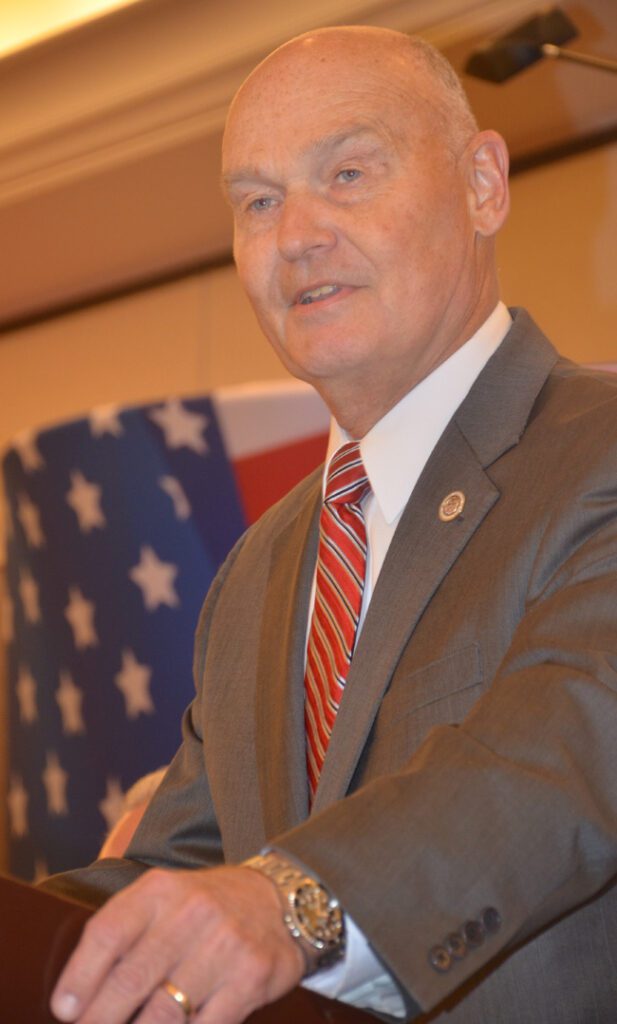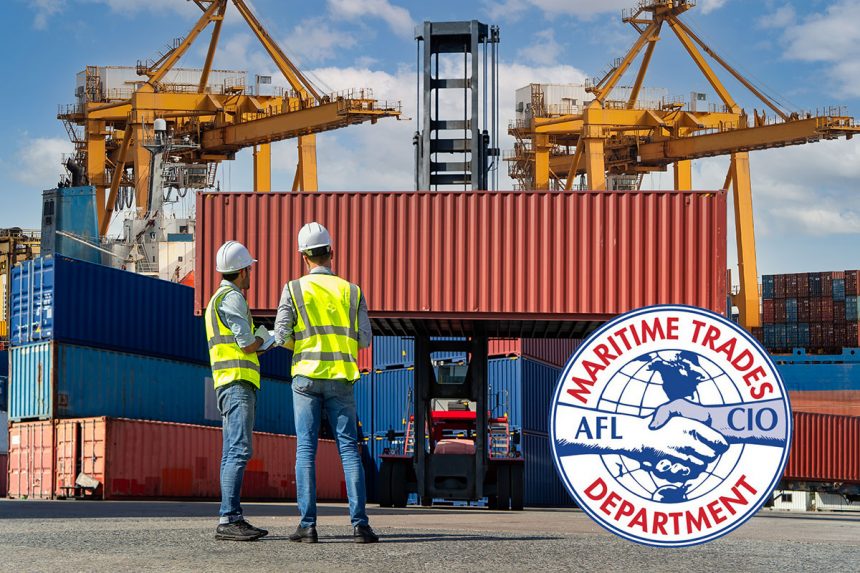
The head of the U.S. Maritime Administration (MarAd) repeated his unwavering support for the U.S. Merchant Marine and the laws and programs that keep it viable when he addressed the MTD Convention in St. Louis on October 20.
U.S. Maritime Administrator Mark Buzby spelled out his support for the Jones Act, the Maritime Security Program (MSP), cargo preference laws, domestic shipbuilding, and American crews.
After being introduced by MTD President Michael Sacco, Buzby credited U.S. Transportation Secretary Elaine L. Chao for inspiring him to accept his nomination at MarAd, which is a Department of Transportation agency. Buzby served as commanding officer of the U.S. Military Sealift Command from 2009-13, but had retired from that post and went on to head the National Defense Transportation Association.
“I couldn’t ask for a better boss,” Buzby said of Chao. “She totally gets maritime; she knows it inside out…. She is a true backer of the Jones Act.”
Speaking both of union officials and rank-and-file members, Buzby stated, “Your members provide an incalculable service to the maritime industry and the U.S. Merchant Marine, promoting not only a comprehensive legislative agenda, but, perhaps more importantly, especially now, educating Congress, the administration, the international community and the American public about this vitally important industry. You need only look back over the last few weeks to see all of the misinformation and alternate narratives that have been going out discussing things like the Jones Act and American Merchant Marine and shipping to see just how much baloney that’s floating around out there that is being spewed over and over and over again. So, educating all levels of government is really key and something I’m going to be taking on with renewed effort. I appreciate the strong efforts by industry, by the folks in D.C. that do this for a living that go around and help with educating our lawmakers and others to continue forth with that.”
The administrator noted that he took the job at an exceptionally busy time, in light of the recent hurricanes.
“To say it was a good test of our U.S.-flag fleet is an understatement,” Buzby remarked. “I can say our crews stood tall. In my book, they were heroes. They answered the bell, they stayed the course, and they saved lives.”
He expressed confidence in the Ready Reserve Force (RRF), describing it as “an essential security asset for the nation.” But, he added, the fleet is getting old, though all of the vessels activated recently for relief efforts performed well.
Turning to the nation’s freight cabotage law, Buzby shook his head at the erroneous reporting about its effect on relief efforts in Puerto Rico.
“The Jones Act has always been an easy target for people who, frankly, either don’t get it or are too lazy to get the facts right,” Buzby stated. “All these missions that our Jones Act carriers were performing (in Puerto Rico), that’s the real deal. They literally saved American lives along with thousands of others. The U.S. Merchant Marine delivered in this crisis. It did its job despite all the accusations and false narratives being thrown about in the media.”
In addition to other benefits America enjoys because of the Jones Act, Buzby added, “It’s not news to most in this room, but it’s also the backbone of our shipbuilding and repair industry, directly supporting 110,000 employees, represented by many of you, and adding over $9.2 billion in labor income to the U.S. economy annually. The Jones Act generates $10 billion in freight revenue and provides as much as $355 million in federal and state tax revenue. The Jones Act is responsible for over 38,000 on-the-water jobs, and for $4.7 billion in wages, salaries, and benefits paid to your seafarers.”
He continued, “This industry and the supply chain is the same one we depend on to build and repair ships for our Navy. The military relies on these U.S. civilian mariners to crew both the commercial and the government cargo ships needed in wartime. The Jones Act is a core pillar of our national security. It supports our entire system of military deployment and sustainment which depends on a viable, qualified, sufficient pool of talent: your members.”
Buzby described a civilian shipboard manpower shortage (calling it “the heart of my message”) and said it’s a critical circumstance that must be improved. He pointed out the motto on the U.S. Merchant Marine flag reads, “In Peace and War.”
“That message can’t be emphasized enough,” he said. “Throughout my Navy career, I’ve seen it firsthand how critical it is that we do whatever it takes to maintain our ability to project our forces internationally, and then sustain them for extended engagements. We want to be able to play the away game; we don’t ever want to play the home game.”
He described various military equipment and vessels utilized in wartime before asking, “Where does all that stuff come from? It comes from the U.S. Merchant Marine carrying it forward. There’s not a buoy out there they tie up to and they get all this stuff from. It has to come by ship.”
Buzby reiterated his support of the MSP and cargo preference. A day earlier, the Senate had conducted a hearing on food aid that unduly and harshly attacked cargo preference laws. While some legislators want to reduce or eliminate the use of American-flag ships to carry such cargo, Buzby said the administration wants to increase the percentage of preference cargoes transported on U.S.-flag vessels.
“There’s all sorts of discussion,” he said. “We’re obviously going to be pushing for as high as we can because cargo means ships, ships means jobs, jobs means we have the pool of mariners that we need to do our job. All three of those are critical to maintaining our U.S. Merchant Marine.
“The challenge is getting people – again, educating them – to see the big picture of the importance of our U.S. Merchant Marine to the national and economic security,” he continued. “That’s kind of never-ending. For that reason, I appreciate the strong support that the Maritime Trades Department has voiced for decades for both the seafarers and the industry you work in and represent. Your voice has never been more important, and I personally appreciate your commitment to help the general public and our elected representatives to understand what they are doing when they turn their backs on the U.S.-flag fleet.”

